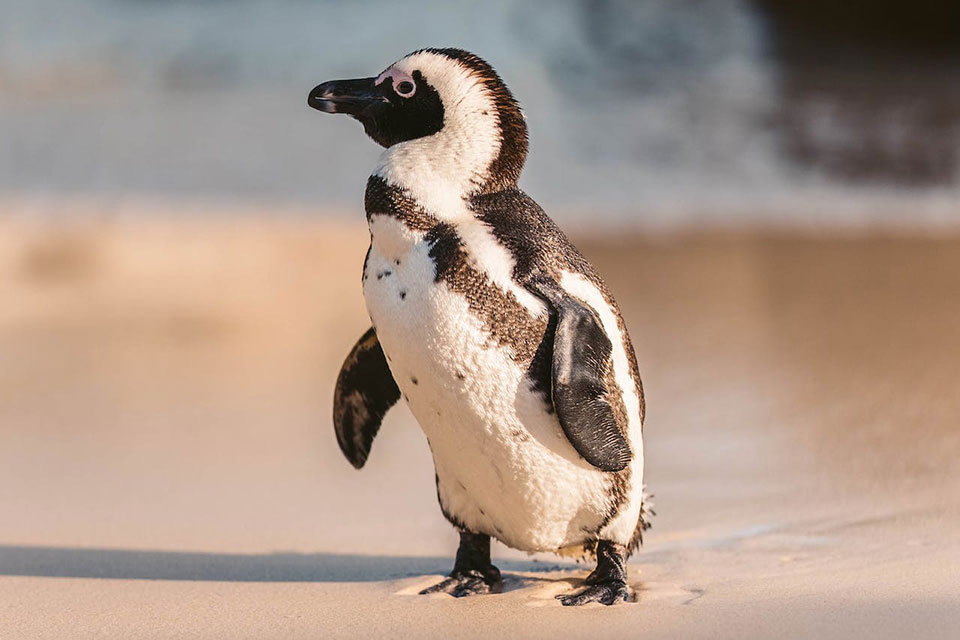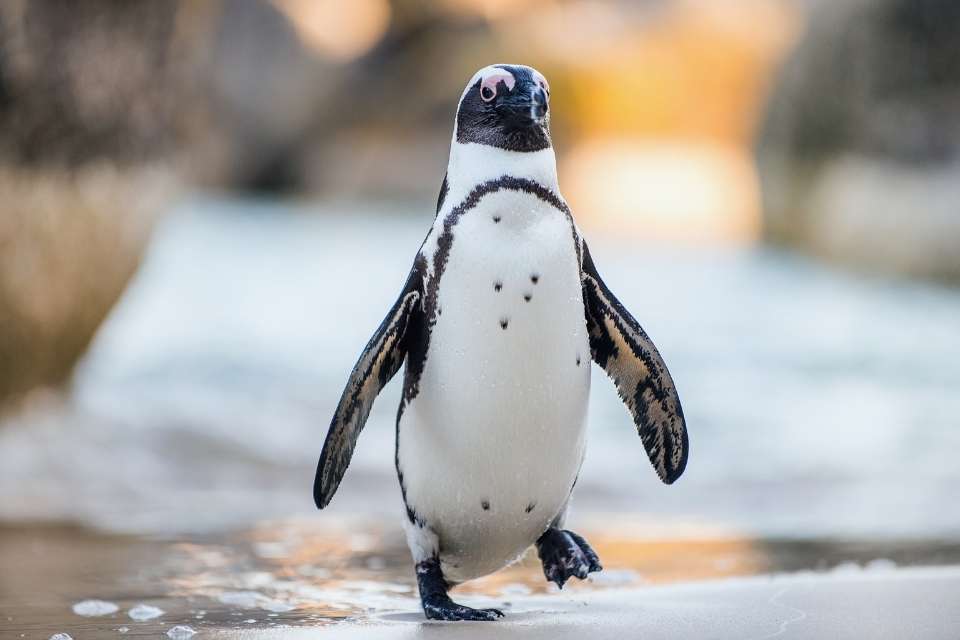When it comes to unique wildlife, South Africa has a lot to offer. And yes, you heard it right – there are penguins in South Africa!
These fascinating creatures, known as African penguins, can be found along the Western Cape coastline and on various islands. They are a delight for tourists and nature lovers, as they can be observed in their natural habitat.
The African penguin, also known as Cape penguin or South African penguin, is a species of penguin that exclusively resides in southern African waters. With their distinctive black and white markings, these flightless birds capture our attention and hearts.
But where exactly can you find them? Let’s explore!
Key Takeaways:
- African penguins, also known as Cape or South African penguins, can be found in South Africa.
- They reside along the Western Cape coastline and on various islands, including Dassen Island, St Croix Island, and Robben Island.
- Popular mainland sites to observe penguins include Boulders Beach in Simon’s Town near Cape Town.
- Penguins in South Africa are an endangered species, and their conservation is crucial.
- By supporting conservation efforts, we can help ensure the survival of African penguins for future generations.
African Penguin Species and Conservation Status
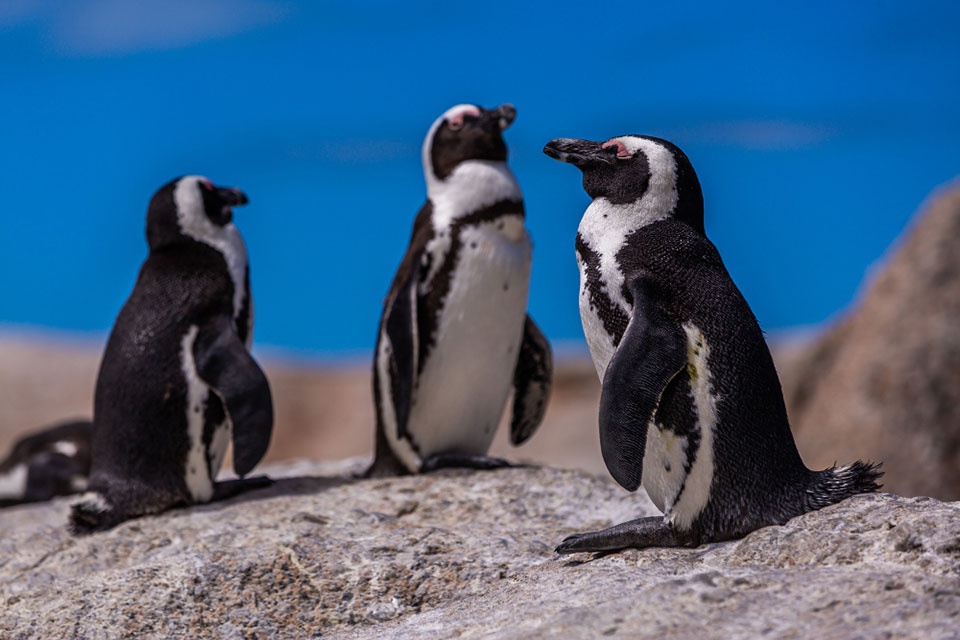
The African penguin, scientifically known as Spheniscus demersus, is a critically endangered species that holds a significant presence in South Africa.
This unique penguin species breeds exclusively in Namibia and South Africa, and it is closely related to other penguin species found in South America. However, the African penguin population has experienced a significant decline over the years, with only two percent of the population remaining from the early 1900s.
Today, there are fewer than 20,000 breeding pairs left in the wild, with a substantial population residing in South Africa.
As an endangered species, African penguins require special attention and conservation efforts. The decline in their population can be attributed to various factors, including habitat loss, reduced food availability, and human activities.
It is essential to protect their breeding colonies and provide them with suitable habitats to ensure their survival.
Threats and Conservation Efforts
The African penguin faces numerous threats that have contributed to its critically endangered status. Predation by seals, caracals, leopards, mongoose, domestic cats, and dogs poses a significant danger to the survival of this species.
Additionally, human activities such as oil spills, marine pollution, habitat destruction, climate change, and industrial fishing have further exacerbated the decline of the African penguin population.
To combat these threats, organizations like the Southern African Foundation for the Conservation of Coastal Birds (SANCCOB) are working tirelessly to rescue, rehabilitate, and release injured or orphaned penguins back into the wild.
These conservation efforts are crucial in safeguarding the African penguin population and ensuring its long-term survival.
“The African penguin is a fascinating species that requires our immediate attention and conservation efforts. By addressing the various threats they face and protecting their habitats, we can make a significant impact on their survival.”
It is our collective responsibility to raise awareness about the plight of African penguins and support conservation initiatives. By taking action, we can help protect these charismatic birds and ensure that future generations can continue to admire them in their natural habitat.
Penguin Populations in South Africa
South Africa is home to a thriving population of African penguins, with several locations along the Western Cape coastline where these charismatic birds can be observed in their natural habitat.
One of the most popular destinations to see penguins in South Africa is Boulders Beach, located in Simon’s Town near Cape Town. This picturesque beach is home to several hundred African penguins year-round, making it a must-visit spot for wildlife enthusiasts.
During November, hundreds of penguins from False Bay and other areas along the southern coast of South Africa and Namibia come to Boulders Beach to molt.
This annual migration adds to the colony’s diversity and offers visitors the chance to witness a unique spectacle. By April, the penguin population at Boulders Beach reaches approximately 1,000 breeding pairs, creating a bustling and vibrant environment.
In addition to Boulders Beach, other sites in South Africa also offer opportunities to spot African penguins. Stony Point in Betty’s Bay, for example, is home to another colony of these fascinating birds.
Whether you’re exploring the islands of Dassen Island, St Croix Island, and Robben Island, or venturing to the mainland sites, you’re bound to encounter the captivating presence of South Africa’s penguins.
Protecting Penguin Populations
Preserving the well-being of the penguins in South Africa is of utmost importance. These birds face numerous threats to their survival, including predation by seals, caracals, leopards, mongoose, and domestic animals.
Human activities, such as marine pollution, habitat destruction, oil spills, industrial fishing, and climate change, also contribute to their population decline.
Organizations like the Southern African Foundation for the Conservation of Coastal Birds (SANCCOB) play a vital role in the rescue, rehabilitation, and release of injured or orphaned penguins back into the wild.
Efforts are underway to raise awareness about the plight of African penguins and implement conservation measures to protect their habitats and ensure their long-term survival.
Visiting and supporting penguin colonies in South Africa not only provides a memorable experience but also contributes to the preservation of these endangered species.
By learning about their behavior, witnessing their natural habitats, and advocating for their conservation, we can all make a difference in safeguarding the future of African penguins.
Characteristics and Behavior of African Penguins
African penguins, also known as jackass penguins, are fascinating creatures with unique characteristics and behaviors. Here are some key facts about these remarkable birds:
- African penguins are flightless birds that can grow up to two feet tall and weigh up to 11 pounds.
- They have distinctive black and white markings, with pink patches of skin above their eyes and a black facial mask.
- One of the most interesting features of African penguins is their braying call, which sounds like a donkey’s bray. This is why they are sometimes called “jackass penguins.”
- These penguins primarily feed on fish and squid, using their streamlined bodies and webbed feet to swim and catch their prey.
- African penguins are monogamous and breed in colonies. Both parents take turns incubating the eggs and caring for the chicks.
- The breeding season for African penguins typically begins in March, and the chicks hatch about 40 days after the eggs are laid.
- On average, African penguins have a lifespan of 20 to 30 years.
Observing African penguins in their natural habitat is a rewarding experience for visitors to South Africa.
Their playful antics and unique appearances make them a popular attraction at sites such as Boulders Beach in Simon’s Town, where tourists can witness these incredible birds up close.
Protecting African Penguins
While African penguins captivate us with their charm, it’s essential to recognize and address the threats they face.
Human activities, such as oil spills, marine pollution, habitat destruction, and overfishing, contribute to the decline of African penguin populations. Climate change also poses a significant risk, affecting the availability of their food sources.
Conservation organizations like SANCCOB play a crucial role in the protection and rehabilitation of African penguins. These organizations rescue injured and orphaned penguins, provide medical care, and release them back into the wild.
Additionally, they work to raise awareness about the plight of the African penguins and advocate for stronger conservation measures.
By supporting these conservation efforts and promoting responsible tourism, we can help ensure the long-term survival of African penguins and preserve their natural habitats for future generations to enjoy.
Conservation Efforts and Threats to African Penguins
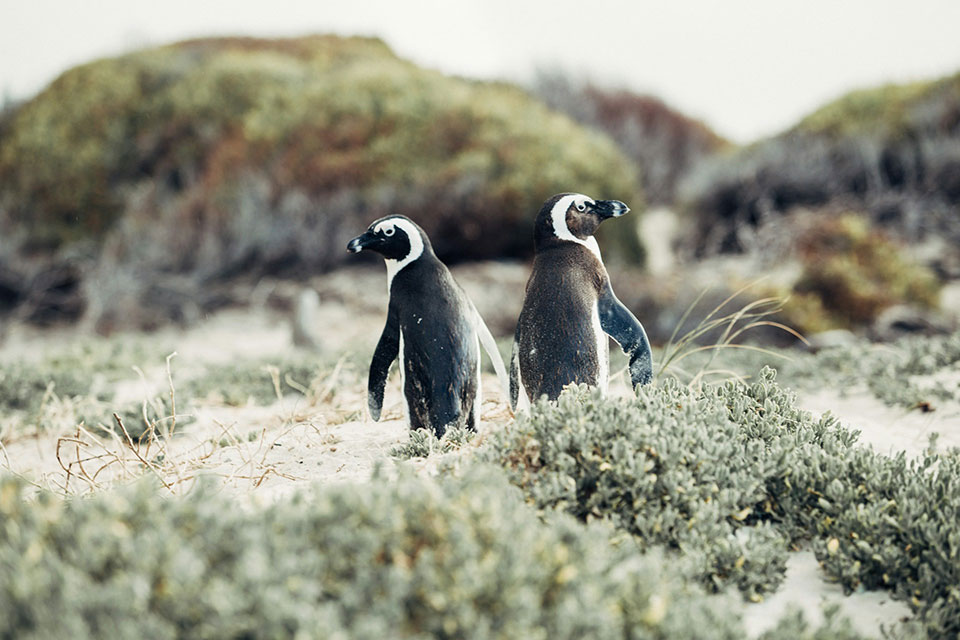
The African penguin population faces numerous threats to its survival, making it imperative to take action to protect and conserve these endangered birds. Predation by seals, caracals, leopards, mongoose, and domestic animals like cats and dogs puts significant pressure on penguin colonies.
Additionally, human activities such as oil spills, marine pollution, habitat destruction, climate change, and industrial fishing have detrimental impacts on the African penguin population in South Africa.
Threats to African Penguins:
- Predation by seals, caracals, leopards, mongoose, and domestic cats and dogs
- Human activities like oil spills, marine pollution, habitat destruction, climate change, and industrial fishing
Fortunately, organizations like the Southern African Foundation for the Conservation of Coastal Birds (SANCCOB) are working tirelessly to address these threats and protect penguin colonies. SANCCOB plays a vital role in rescuing, rehabilitating, and releasing injured or orphaned penguins back into the wild.
By providing medical care, food, and shelter to these vulnerable birds, SANCCOB contributes to the conservation and preservation of African penguins in South Africa.
“Protecting the African penguin colonies is crucial for their survival. We must raise awareness about the threats they face and support organizations like SANCCOB in their conservation efforts. Together, we can make a difference and ensure the long-term survival of these remarkable birds.”
It is essential for both locals and tourists to understand the challenges African penguins face and their important role in the ecosystem.
By joining forces, we can promote responsible tourism, reduce pollution, and support sustainable fishing practices, all of which contribute to the protection of penguin habitats.
Together, we have the power to safeguard the future of African penguins and preserve their natural heritage for generations to come.
Where to Find Penguins in South Africa
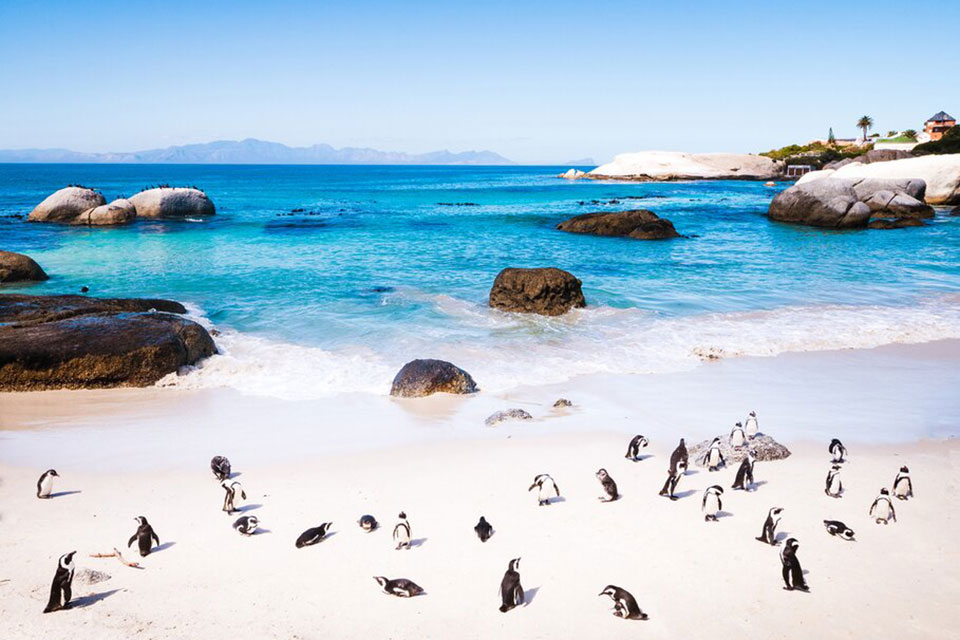
If you’re eager to spot penguins in South Africa, you’re in luck. There are several locations along the Western Cape coastline where you can observe these fascinating creatures in their natural habitat.
One of the most popular spots is Boulders Beach in Simon’s Town, located near Cape Town. This picturesque beach is home to a thriving colony of African penguins.
Boulders Beach offers a unique opportunity to get up close and personal with these adorable creatures. You can watch them waddle along the sandy shores, take a dip in the crystal-clear waters, and interact with their fellow colony members.
The beach is equipped with designated boardwalks and viewing platforms that ensure both the safety of the penguins and an optimal viewing experience for visitors.
In addition to Boulders Beach, there are other islands and mainland sites where penguins can be found. Islands such as Dassen Island, St Croix Island, and Robben Island host significant penguin colonies.
These islands provide important breeding and nesting grounds for the penguins.
If you’re visiting South Africa and have a love for wildlife, make sure to include penguin spotting on your itinerary.
Not only will you witness the unique behavior and characteristics of these charming birds, but you’ll also contribute to the conservation efforts aimed at protecting their fragile habitats.
So grab your camera and get ready for an unforgettable experience with the delightful penguins of South Africa.
The Plight of African Penguins
The African penguin population is facing a grave threat, as they are classified as critically endangered. These charming birds have experienced a drastic decline in their numbers over the years.
Factors such as habitat loss, climate change, and reduced food availability contribute to their precarious situation. It is crucial that we take immediate action to protect and conserve their habitats, as well as raise awareness about their plight.
“We must prioritize the conservation of African penguins to ensure their long-term survival,” says Marine Biologist Dr. Sarah Peterson. “By addressing the factors impacting their populations, such as overfishing and pollution, we can make a significant difference in preserving these unique and iconic species.”
According to a recent study by the South African Penguin Conservation Trust, the current African penguin population stands at fewer than 20,000 breeding pairs. This represents a stark decline from the early 1900s when their numbers were much higher.
Conservation Efforts
To combat the decline of African penguins, organizations like the Southern African Foundation for the Conservation of Coastal Birds (SANCCOB) are working tirelessly to rescue, rehabilitate, and release injured or orphaned penguins back into the wild.
SANCCOB also plays a crucial role in monitoring and managing penguin colonies to ensure their protection.
Additionally, research and educational initiatives are being carried out to raise awareness and promote conservation efforts.
By engaging local communities, tourists, and policymakers, we can create a collective effort to safeguard the future of South Africa’s penguin populations.
The Way Forward
The journey to save the African penguins is a collective responsibility. Through supporting and participating in conservation efforts, we can help create a brighter future for these incredible creatures.
By preserving their habitats, reducing pollution, and advocating for sustainable fishing practices, we can secure the survival of these unique and vital species for generations to come.
Conclusion
In conclusion, South Africa is indeed home to a thriving population of African penguins. These captivating creatures can be found along the scenic Western Cape coastline, including popular sites such as Boulders Beach in Simon’s Town.
The presence of penguins in South Africa provides a unique and fascinating opportunity for locals and tourists alike to observe these endangered species in their natural habitat.
However, it is crucial to recognize the challenges that African penguins face. Factors such as habitat loss, climate change, and reduced food availability pose significant threats to their survival.
To ensure the long-term conservation of these remarkable birds, it’s important for us to support organizations like SANCCOB and raise awareness about their plight.
By taking action to protect and conserve the habitats of African penguins, we can make a positive impact on their population. Together, let’s work towards securing a future where these charismatic birds continue to enchant us with their presence.
So yes, there are indeed penguins in South Africa, and it’s up to us to ensure they have a safe and flourishing environment for generations to come.
FAQ
Are there penguins in South Africa?
Yes, there are penguins in South Africa. The African penguin, also known as the Cape penguin or South African penguin, can be found in several locations along the Western Cape coastline.
What is the conservation status of African penguins?
The African penguin is a critically endangered species. The population has significantly declined over the years, with fewer than 20,000 breeding pairs left in the wild.
Where can I find penguins in South Africa?
Penguins can be found at various locations along the Western Cape coastline, including islands such as Dassen Island, St Croix Island, and Robben Island.
Mainland sites like Boulders Beach in Simon’s Town also offer opportunities to observe penguins in their natural habitat.
What are the characteristics and behavior of African penguins?
African penguins are flightless birds that grow to be about 60-70 cm tall and weigh between 2 and 5 kg They have distinctive black and white markings, with pink patches of skin above their eyes and a black facial mask.
They feed primarily on fish and squid and are known for their unique braying call. They are monogamous and breed in colonies, with both parents taking care of the chicks.
What are the threats to African penguins?
African penguins face threats such as predation by seals, caracals, leopards, mongoose, and domestic cats and dogs.
Human activity, including oil spills, marine pollution, habitat destruction, climate change, and industrial fishing, also contribute to the decline of the African penguin population.
What efforts are being made to protect African penguins?
Organizations like the Southern African Foundation for the Conservation of Coastal Birds (SANCCOB) work to rescue, rehabilitate, and release injured or orphaned penguins back into the wild.
It is crucial to address these threats and protect penguin colonies to ensure the survival of the species.
Why are African penguins important to conserve?
African penguins are a critically endangered species and play a vital role in the ecosystem. They are also popular with tourists, contributing to local economies.
By supporting conservation efforts and raising awareness, we can help ensure the survival of African penguins for future generations to enjoy.

